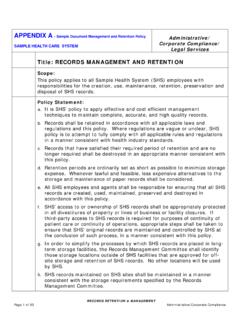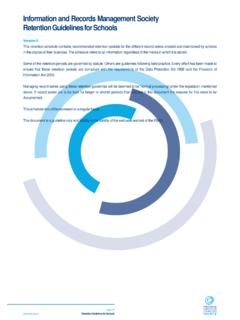Transcription of Records Retention Scheduling: A Procedural Guide
1 Version Edition of September 2007 1 Records Retention scheduling : A Procedural Guide Contents 1. Introduction Definitions Legal Requirements State Archives and Records Commission Summary of the Process 2. Records Inventory When to Conduct an Inventory Participants 3. Records Retention Schedule The Records Series Contents of the Retention Schedule Types of Retention Schedules 4. Records Description and Analysis 5. Retention Schedule Approval 6. Administrative Regulations 7. Retention Schedule Distribution 8. Timeline Appendix A: Records Description and Analysis Form and Instructions 1. Introduction Government agencies in Kentucky are required by law to establish and maintain effective Records management programs as a normal part of their daily activities.
2 Public Records are those Records created or received by state and local government agencies in the course of regular business. Public Records are created in a variety of formats paper, film, videotape, or digital file, for example. Public Records are important because they allow government agencies to effectively carry out programs, document actions and policies, secure the legal and financial rights of government, Version Edition of September 2007 2protect the rights of citizens, and record the history and intent of public policy. Records management involves maintaining physical and intellectual control of Records so that they are secure and accessible for use as long as needed. Records Retention schedules are central to proper Records management . Retention schedules are inventories, or lists, of all Records that agencies create, use or maintain, together with information indicating how long a record should be kept to meet business needs and what should happen to it when the business need has ended.
3 Maintaining documentation of essential transactions and information on an agency over time requires that certain Records be retained permanently, while efficient, effective business operations dictate that selected Records be destroyed when there is no further use for them. Evaluating Records and assigning value to them, known as Records appraisal, is central to the Records Retention scheduling process. These procedures describe the Retention scheduling process for Kentucky s state and local government agencies and identify the roles and responsibilities of all participants in the process. Definitions Appraisal is the process of determining the value and then the disposition of Records based on their current administrative, legal and fiscal use; their evidential and informational or research value; their arrangement; and their relationship to other Records .
4 Commission is the State Archives and Records Commission, defined in KRS (3) and Department is the Kentucky Department for Libraries and Archives, defined in KRS Disposition is the action taken with regard to non-current Records following their appraisal. These actions might include: transfer to the State Records Center for temporary storage; transfer to the State Archives for permanent preservation; maintain in agency; reproduce on microfilm; or destroy. Division is the Public Records Division, Kentucky Department for Libraries and Archives. Version Edition of September 2007 3 Public agency, defined in KRS (4), is every state or local office, state department, division, bureau, board, commission and authority; every legislative board, commission, committee and officer; every county and city governing body, council, school district board, special district board, municipal corporation, and any board, department, commission, committee, subcommittee, ad hoc committee, council or agency thereof; and any other body which is created by state or local authority and which derives at least twenty-five percent (25%) of its funds from state or local authority.
5 Public record or record , defined in KRS (1), is documentary material, regardless of physical format, which is prepared, used or retained by public agencies in connection with regular agency business. Records inventory or inventory is a list identifying the location, name and description of each Records series, held by a state or local government agency. A completed inventory provides information essential to preparing a Records Retention schedule, with appropriate Retention and disposition instructions, for Records created and maintained by a state or local government agency. Records officer, defined in 725 KAR 1:010, is the public agency employee who represents a unit of government in its relations on Records management issues with the division. Records series is a file unit or group of documents related to a particular subject or function, resulting from the same activity, having a common form, or having another relationship in their creation, receipt or use.
6 Records series number or series number is a unique identifying number assigned to each Records series on a Records Retention schedule. Retention period is the length of time a record is to be maintained in an accessible format. Records may be maintained at the creating agency or at an approved archives or Records storage facility. Version Edition of September 2007 4 Retention schedule or schedule is a document governing the Retention and disposition of Records series of a state or local public agency. A schedule contains a list of the various Records or Records series created, used or maintained by a public agency, together with information about the specific periods of time during which Records must be maintained and disposition instructions to be applied to the series when its business use has ended. Legal Requirements The inventory and appraisal of Kentucky s public Records are subject to the terms of KRS (the State Archives and Records Act), in conjunction with 725 KAR 1:030, scheduling public Records for Retention and disposal; procedures.
7 The Commission has explicit authority under Kentucky statute to review and approve state and local government agency schedules for the Retention and destruction of public Records . Instructions for the Retention and disposition of Kentucky public Records are found on Commission-approved Records Retention schedules (KRS ), which provide an agency with appropriate legal authority to make disposition of its Records . The Commission s decisions are final and binding for government agency Records . The head of each state and local government agency is responsible for establishing and maintaining an effective, continuing program for the management of the agency s Records . This includes proper Records Retention and disposition (KRS ), following the procedures of the Commission In the Retention scheduling process, the Department serves as the link between the Commission and state and local government agencies across the state.
8 KRS charges the Department with ensuring the maintenance and security of Records deemed appropriate for preservation and for facilitating the segregation and disposal of Records of temporary value. This is best accomplished by maintaining complete, up-to-date Records Retention schedules and by agencies regular application of their schedules to the management of their Records . Version Edition of September 2007 The State Archives and Records Commission The Commission meets quarterly in March, June, September and December, on the second Thursday of each month. New Records Retention schedules, and additions or changes to existing schedules are submitted to the Commission. The Commission is also authorized to create advisory bodies to obtain advice on archives and Records management issues. Duties of the Commission Under the terms of KRS , the Commission shall: Advise the Department on matters relating to archives and Records management ; Review and approve schedules for Retention and destruction of Records for all state and local government agencies; and Determine all questions which relate to destruction of public Records .
9 Members of the Commission The Commission is a seventeen-member body. Eight of its members, or their appointed representatives, serve ex officio: The State Librarian, who serves as chair of the Commission The Secretary of the Education Cabinet The Auditor of Public Accounts The Chief Justice of the Supreme Court The Director of the Legislative Research Commission The Attorney General The State Budget Director The Commissioner of Technology, Commonwealth Office of Technology Nine of its members are appointed by the governor for four year terms. These members represent: The University of Kentucky State Universities and Colleges Version Edition of September 2007 6 The Kentucky Historical Society The Kentucky Library Association Local governments Citizens at Large (four members) Summary of the Process Retention scheduling involves several steps, including: Records inventory comprehensive Records description; Records appraisal, with a recommended Retention period; proposed Retention periods and disposition instructions reviewed and approved by the Commission ; promulgation of an administrative regulation implementing approved Records Retention schedules ; and appropriate distribution of approved Records Retention schedules.
10 2 The Records Inventory The Records Retention scheduling process begins with an inventory of the Records created, used or maintained by a state or local government agency. When to Conduct an Inventory A Records inventory may be necessary due to one or more circumstances: the Commission has not approved a Records Retention schedule for a state or local public agency; or a Records Retention schedule that has been approved by the Commission is in significant need of revision; or a current, Commission-approved Records Retention schedule needs additions or changes, though not significant revision; or Version Edition of September 2007 7 the record Description and Analysis form (See section 4) for a given Records series is in need of revision. Participants Participants in the Records inventory should include, but need not be limited to: the public agency s Records officer or custodian of Records other state or local government agency personnel who are familiar with the Records under consideration, and the appropriate Division staff.













